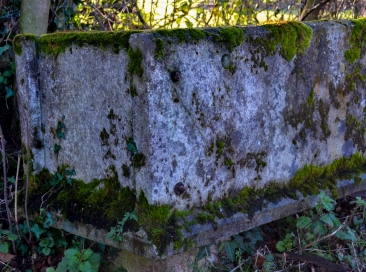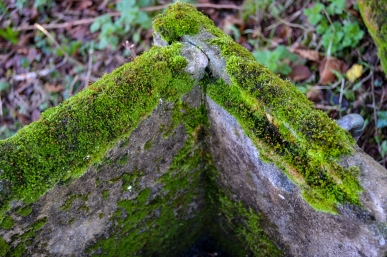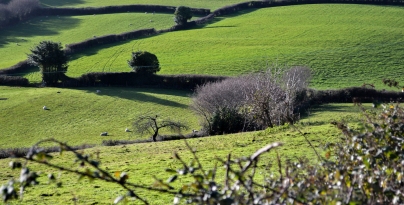
Inspiration can come from the unlikeliest of places. Not so long ago I was clearing out this old stone trough at the field where I keep my horses. Accompanied by a young Dartmoor Tinker who needs to check out all new activity, especially if it involves a possibility of food, I spent a morning sweeping the dead leaves at the bottom of the trough into a dustpan, which I then emptied out into a hedge. It was one of those rhythmical field maintenance tasks that I find curiously satisfying, and the company of the pony who easily settled into my working rhythm, mirroring my pauses and bursts of sweeping and scraping activity, made what could have been a simple, mundane task a delightful chore.
At some point in my emptying of the old mushed leaves from the dustpan I noticed a dull gleam of metal at the back of the trough. With the pony nosing at my elbow, to check that I wasn’t laying down a tasty trail of sugar beet as I cleared away the leaves, I worked until the stone floor of the trough was clear. I emptied my final pan of debris and then I saw that the metal gleam came from something solid and round. Leaning over to inspect it more closely I saw that it was a fist-shaped ball that had rolled against the back of the trough where it had probably remained hidden for years.

The idea that this metal ball had lain under cover for a while led to a curious associative train of thinking that went something like this: that ball looks like a small artillery shell. I wonder whether it is a shell? Could it possibly be a shell? I know that shells from the Second World War have been discovered in fields. This trough obviously hasn’t been cleaned out in years. Maybe no one has realised that there is a shell behind it. Maybe (getting excited) I’m the first person to discover this shell? Maybe (getting worried) I need to do something about it? Maybe (looking at Tinker who is trying to lick the new discovery) we need to get out of here, or call the army to come and safely defuse it. Maybe…

Looking up I saw someone coming towards me that at first I didn’t recognise, so enraptured was I by my mental narrative. He was waving at me and in my state of alarm I thought that he had broken into the field. Another problem to compound the problem of the unexploded shell that I needed to deal with: how was I going to get this crazy trespasser off the land? He got closer and I saw that it was Brian, the owner of the field. Our conversation went something like this.
Hi, B, I’ve left some biscuits in your shed.
Oh, thanks Brian, you won’t believe this (he didn’t), but come and have a look at something. I think I might have found a shell behind the old trough.
What sort of shell?
Well maybe it’s left over from the war, but you would be able to tell me, what do you think?
Brian leaned over the trough and his eyes shone as he retrieved what he promptly announced was an old brass ballcock. ‘I’ll take that, useful bit of metal.’ He had the shell in his hands and I still couldn’t quite believe that it wasn’t going to explode in his face. I still needed time to reset my thinking. Brian read my expression ‘Boom!’ he said as he pocketed the ballcock and wishing me a good morning strode up the field.
I laughed with him, but the discovery stayed with me. What I had uncovered was an insight into a habitual and superstitious way of thinking. Why did I assume that the ballcock was a Second World War shell? Why was I convinced that I needed to go to great lengths to sort out a problem that was not even a problem? Why did I fail to recognise Brian?
Interestingly madness was my first thought (you can see how this habit of catastrophic thinking is totally ingrained) of course I thought it was a shell because I’m going mad. Those headaches I’ve been experiencing are part of the madness and the fact that I didn’t recognise Brian confirms that I’m going mad.
What I needed to do was to get a grip on my loopy thoughts and stop believing in them. Taking our random thoughts seriously is something we all do. We habitually try to give a shape or narrative to our random thoughts because we can make sense of randomness when it becomes a story. Telling stories is an ancient way of thinking. Ships didn’t exist for islanders until stories were invented to describe them. Maybe nothing exists without a story. I’m still slightly disappointed that I didn’t have to call the army.My story didn’t end in the way that I expected.
The point of this story, though, is that it has made me realise how easy it is to believe in the story rather than seeing things as they are. Boom!
I’d be interested in hearing from anyone else prepared to share their own random thought stories.
Leave a comment